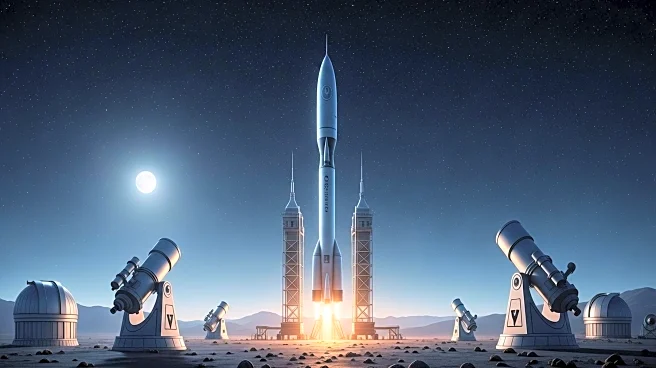What is the story about?
What's Happening?
President Trump has signed an executive order aimed at streamlining rocket launches, a move celebrated by the commercial space sector for its potential to bolster America's leadership in space exploration. However, this decision has sparked alarm among scientists, environmental activists, and astronomers. The growing network of satellite constellations, particularly those launched by SpaceX's Starlink, is increasingly crowding the skies, obscuring the stars, and complicating astronomical research. Astronomers like Samantha Lawler have reported difficulties in their work due to the bright streaks of satellites interfering with their observations. The executive order could accelerate the number of rockets and satellites launched, potentially exacerbating these issues and causing unintended environmental damage.
Why It's Important?
The executive order's impact on the commercial space industry is significant, as it could lead to a rapid increase in satellite launches, further complicating the work of astronomers and potentially causing environmental harm. The proliferation of satellites raises concerns about space debris and the risk of collisions, which could lead to a scenario known as Kessler Syndrome, where cascading collisions render orbit inaccessible. This situation poses a threat to scientific research and could have long-term implications for space exploration and communication technologies. The deregulation of commercial space operations may prioritize industry growth over environmental and scientific considerations, affecting stakeholders in both sectors.
What's Next?
As the number of satellites in orbit continues to grow, companies like SpaceX are implementing avoidance systems to prevent collisions. However, the real challenge will arise when competitors launch their own satellites, necessitating coordination and data sharing to avoid accidents. The potential for a serious collision in orbit could prompt policymakers to reconsider the current deregulation approach. Astronomers are calling for a moratorium on rocket launches to address these concerns, but commercial space companies show no signs of slowing down their ambitions. The situation may require a significant incident to drive regulatory changes and ensure the sustainable development of space operations.
Beyond the Headlines
The ethical and environmental implications of the executive order are profound. The potential for space debris to cause ozone depletion and alter atmospheric conditions highlights the need for responsible space management. The dominance of private companies in controlling orbit access raises questions about the balance between commercial interests and scientific research. The engineering challenges of delivering services with fewer satellites and extending their lifespan are critical to mitigating the negative impacts on astronomy. The situation underscores the importance of integrating environmental and scientific considerations into space policy to prevent long-term damage to the Earth's orbit and ensure the continued advancement of space exploration.














